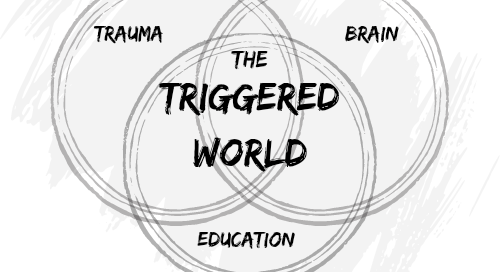We live in a triggering world.

You hear it everywhere. Trigger warnings. You triggered me. He/him triggered they/them, then that made she/her feel unsafe. The word is thrown around as an accusation, a warning, an excuse, for issues and behavior. “It’s not my fault that I did that, [your actions, your words, that text, that event, that post] triggered me.”
It is an inevitable characteristic of our current culture that there are going to be triggering events, words, people, everywhere. Anything and everything can cause you to react negatively if you allow it to.
But the point is to not allow it to. How do we live in a world that is constantly trying to get under our skin? How do we teach our children to be compassionate and stable in a world that is screaming vile in their faces?
I started this Substack, and I started writing decades ago, in an attempt to unravel my triggers. Why was I triggered? What did I have control over? Were there actions and decisions in my life for which I had to take responsibility?
Most importantly - how long was I going to let outside factors influence my inside self?
In his book, The Body Keeps the Score, Bessel Van Der Kolk says, “For the abused child, the whole world is a trigger.”
That short sentence put everything into perspective. But let’s go back a bit.
It’s 1978, Salt Lake City, Utah. Two 21-year-old Mormons get married after having met five months before. One is secretly gay. The other is carrying baggage from being raised by an alcoholic mother, and me. Of course, they don’t know that yet.
This is the foundation of my own triggered world. Secrets, undiagnosed psychological issues, lies, religion, alcoholism, topped off with a demand to make it all look nice on the outside. One of my most poignant childhood memories is when we had to take a family photo when I was about six or seven. The Mormon church was holding, as it was prone to do, free family photo sessions. I was the oldest of four kids (soon to be five), and a dedicated tom boy. I HATED dresses. I was also a pretty determined kid. Nowadays I would be labeled “Strong-Willed Child” and my parents would be watching Dr. Phil for tips to make my inner leader emerge. In the 1980’s, though, I was just difficult.
Picture it. A secretly gay father (he had already started having affairs with men by that time), an incredibly damaged mother (although she had no idea), an expectation to be a perfect smiling Mormon family, and one small, stubborn, dress-hating little girl. A navy blue dress with a giant bib and gaudy bow across the chest. My father beat me until I submitted and wore the hideous thing. My mother’s words to me, later in life, were that I “never tried to get my own way again.”
For years after, every time I saw that family portrait on my wall, I felt a mix of fear, anger, defiance, and shame.
My strong-will smoldered for decades in a dysfunctional soup. It imploded in my twenties into a life of lies, substance abuse, and finally, rehab and recovery. The ideal recipe for being “triggered.”
I don’t tell you this to compare my story to yours. We are not competing for the bottom. My hope is to share my journey, and walk with you on yours, through and out of this mess we’re all in.
Thanks for reading. If you would like to read more, please consider becoming a paid or free subscriber or even sign up as a founding member. Free subscribers will receive general content on the state of our world, including education, trauma, recovery, and a grab bag of other issues that interest me. Paid subscribers have access to my poetry and my newly published memoir, “Running in Shadows.”
Founding members will get a free book of my published poetry!



